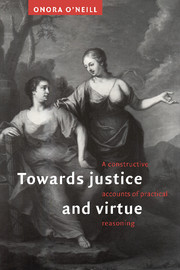Book contents
- Frontmatter
- Contents
- Preface
- Introduction
- 1 Overview: justice against virtue?
- 2 Practical reason: abstraction and construction
- 3 Focus: action, intelligibility and principles
- 4 Scope: agents and subjects: who counts?
- 5 Structure: obligations and rights
- 6 Content I: principles for all: towards justice
- 7 Content II: principles for all: towards virtue
- Bibliography
- Index
7 - Content II: principles for all: towards virtue
Published online by Cambridge University Press: 05 June 2012
- Frontmatter
- Contents
- Preface
- Introduction
- 1 Overview: justice against virtue?
- 2 Practical reason: abstraction and construction
- 3 Focus: action, intelligibility and principles
- 4 Scope: agents and subjects: who counts?
- 5 Structure: obligations and rights
- 6 Content I: principles for all: towards justice
- 7 Content II: principles for all: towards virtue
- Bibliography
- Index
Summary
Might justice be enough? Or, if not enough, might no other inclusive ethical principles for lives and action and attitudes, for institutions and policies prove vindicable? This is the view of many contemporary writers on justice (cf. chapter i). Contemporary friends of the virtues find the view unconvincing and repugnant. They aim to make a complete break with ‘abstract’ theories of justice and with inclusive principles of all sorts. Yet the gulf both parties see between justice and the virtues may be an artefact produced by approaching the two from quite different directions, a difference of approach too often ‘justified’ only by inattentive and unconvincing denunciations of the rejected approach (cf. chapters 1 and 3). Yet if virtue need no more be unprincipled than justice need be implacably uniform, a choice between them maybe neither necessary nor plausible.
Even if justice and virtue are consistent, an integrated account of their principles may remain elusive. Any integrated account is likely to focus at least in part on required virtues (if there are any; cf. chapter 5), since these may prove vindicable by arguments analogous to those which can vindicate the requirements of justice, even if they differ from justice in other ways. Principles of justice specify ethical requirements and their recipients; their observance can in principle be claimed, waived and enforced by publicly recognized actions that can be invoked even between strangers, for example by conventional legal means or in routine economic activity. Justice is a matter of perfect obligation, matched by rights; its demands fall on all, and are owed to all.
Information
- Type
- Chapter
- Information
- Towards Justice and VirtueA Constructive Account of Practical Reasoning, pp. 184 - 212Publisher: Cambridge University PressPrint publication year: 1996
Accessibility standard: Unknown
Why this information is here
This section outlines the accessibility features of this content - including support for screen readers, full keyboard navigation and high-contrast display options. This may not be relevant for you.Accessibility Information
- 2
- Cited by
